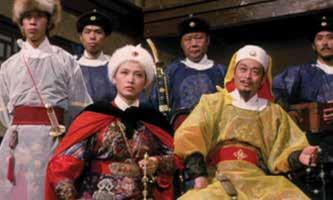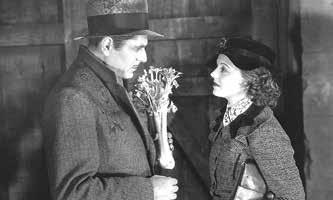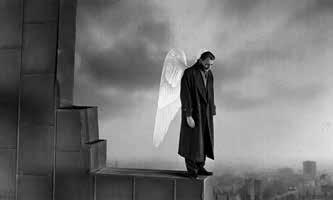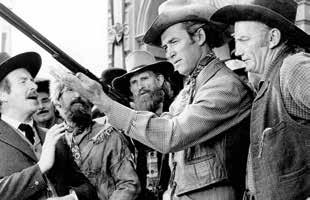
12 minute read
Free Community Workshops at MIFF
July 14 at 11:00 a.m. MIFF Bioblitz at the RiverWalk before Aquarela screening
Ever wondered what animals and plants are around Waterville? Join some local experts for a Mini MIFF Bioblitz to explore what lives near and around the RiverWalk. Meet us at the Two Cent Bridge to explore and document what thrives in Waterville—this walk is appropriate for all levels of experience and all ages.
MIFFONEDGE Performances
Audrey Harrer: Lavender Saturday, July 20, 8:00 p.m.
Audrey Harrer’s “Lavender” is a multi-sensory song cycle that celebrates how memory shapes and guides us. Audience members will receive a “Sensory Program” with six sealed envelopes that correspond with each piece. Surrounded by projections created by cinematographer Michael Pessah, Harrer performs her works on harp/vocals/electronics with cellist Jesse Christeson, complimented by dancers Lonnie Stanton and Tony Guglietti (choreography by Kristin Wagner and Tony Guglietti). From customized refreshments to essential oils to experiments with light, “Lavender” is a meditative journey that encourages audiences to place their own narrative in this immersive experience.
July 18 at 4:00 p.m. Art in the Park: Popcorn Art at the Riverwalk

In honor of the incredible Maine International Film Festival, join us as we make popcorn art! Popcorn is a terrific, healthy snack, but it can also be used to create flower blossoms, paintings, and more! (Don’t worry, we will have some for snacking, too!)
Narcissa Gold: My Body is Your Body is Everybody is Nobody: Consent, Intent, & Boundaries
July 15, 17 + 18 8:30 p.m.
“Consent, Intent, & Boundaries” is a series of live interactive performances exploring specific methods of touch. Each performance will focus on two specific types of interaction: observing, caressing, squeezing, slapping, kissing, and washing. The rationale for each performance builds on the idea that people will attend multiple performances and become more comfortable with interacting with the performer. Touch work tests the boundaries of consent and comfort. Performances are fraught with power dynamics. Our society markets a woman’s body as a commodity to be protected, policed, covered, and used. The “My Body is Your Body is Everybody is Nobody” thesis is a radical act of rebellion where the artist maintains agency while offering a platform to explore touch.



Rare 35mm print! Blue Velvet

USA—1986—35mm— 120 Minutes
In English
Director, Screenplay: David Lynch
Producer: Fred Caruso
Cast: Kyle MacLachlan, Isabella Rossellini, Dennis Hopper, Laura Dern, Hope Lange, Dean Stockwell
Print courtesy: Park Circus Films
David Lynch had already introduced himself to an unwary world with Eraserhead (and his relatively normal—sorta—studio-backed film, The Elephant Man) when he unleashed Blue Velvet on an unsuspecting world in 1986. We really haven’t been the same since. “As fascinating as it is freakish,” said the New York Times’ reviewer, Elvis Mitchell, at the time. “It confirms Mr. Lynch’s status as an innovator, a superb technician and someone best not encountered in a dark alley.” Really, you’d only see the kinds of characters and the kind of plots populating Blue Velvet in your nightmares, not dark alleys. Isabella Rossellini, Kyle MacLachlan, and, most unforgettably, Dennis Hopper, no longer seem like actors, but like phantoms amidst the film’s plot, which leads inexorably from a human ear in a field to a beautiful, troubled nightclub singer and the psycho criminals who kidnapped her child. Yikes!
New digital restoration! Chronicle of the Years of Fire
Algeria—1975—DCP—177 Minutes
In Arabic and in French with English subtitles
Director: Mohammed Lakhdar-Hamina
Screenplay: Mohammed Lakhdar-Hamina, Rachid Boudjedra, Tewfik Fares

Cast: Mohammed Lakhdar-Hamina, Yorgo Voyagis, Leila Shenna
Print courtesy: Cineteca di Bologna, The Film Foundation
In 1975, Chronicle of the Years of Fire won the Palme D’Or at Cannes, the most coveted film festival prize in the world. And yet, it went virtually unseen. “Underneath its overt political exterior and its epic ambitions, there is a delicate personal story to be found. The film relays the tragedy of colonialism, through the eyes of those affected the most; the common citizen. The story follows Ahmad, a poor farmer who starts out living with his family in a tiny decrepit village where the rivers are dry and the land is barren. Through the course of the film...we witness Ahmad go through difficult times, each one more brutal and tragic than the other, and we see that it’s not necessarily radical religion or oppressive politics that give rise to revolution, but a much simpler explanation: that of just trying to survive. Throughout the film there is also one other prominent character who appears from time to time, a homeless madman by the name of Miloud (played amusingly by the director himself), who serves as an unofficial narrator, providing some comic relief, while preaching mostly to an empty graveyard, with remarkable wisdom on the mostly terrible events that will unfold”—Bonjour Tristesse.
Restoration supported by the George Lucas Family Foundation. This restoration is part of the African Film Heritage Project, created by The Film Foundation, FEPACI and UNESCO–in collaboration with Cineteca di Bologna–to help locate, restore, and disseminate African cinema.
Sponsored by Elizabeth Eames
New digital restoration! The Cranes are Flying
Russia—1958—DCP—95 Minutes
In Russian with English subtitles
Director, Producer: Mikhail Kalotozov
Screenplay: Viktor Rozov, based on his play
Cast: Tatiana Samoylova, Aleksey Balakov, Vasily Merkurev
Print courtesy: Janus Films
If you’ve seen I Am Cuba (shown at MIFF recently) you have some idea of the unbelievable visual treat you have in store for you with director Mikhail Kolotozov’s earlier, similarly wildly creative The Cranes Are Flying. If not...well, you are in for a treat. Winner of the Palme d’Or at the 1958 Cannes Film Festival, The Cranes Are Flying is a superbly crafted drama, bolstered by stunning cinematography and impassioned performances. Veronica and Boris are blissfully in love, until the eruption of World War II tears them apart. Boris is sent to the front lines–and then communication stops. Meanwhile, Veronica tries to ward off spiritual numbness while Boris’s draft-dodging cousin makes increasingly forceful overtures. A stunning new digital restoration of a visually ravishing film.

Sponsored by John and Judy Bielecki
Tuesday, July 16, 6:30 p.m., RR1
Friday, July 19, 9:30 p.m., WOH
Friday, July 19, 2:00 p.m., RR3
Saturday, July 20, 8:00 p.m., RR3
Saturday, July 13, 3:30 p.m., RR1
Tuesday, July 16, 9:30 p.m., RR1
Newly restored 35mm print!
Detour
USA—1946—35mm—68 Minutes

In English
Director: Edgar G. Ulmer
Screenplay: Martin Goldsmith
Producer: Leon Fromkiss
Cast: Tom Neal, Ann Savage, Claudia Drake
Print courtesy: The Academy of Motion Picture Arts and Sciences, The Film Foundation, Janus Films
“Who knows when fate or some other mysterious force may put the finger on YOU...for no reason at all!” That’s the unforgettable last line of Detour, which really doesn’t give away much—except its worldview and the fact that it pretty much defines film noir, arriving in 1945 to a country psychically trying to deal somehow with World War II, the dropping of the atomic bomb, and the sudden advent of what was to be called The Cold War. Edgar G. Ulmer’s legendary noir deals with none of that, at least in any overt way. There are really only two characters to speak of: a hitch-hiker and his blackmailer. Made for about 13 cents and absolutely NOT for a major studio, but boasting the darkest of black and white beauty in this wonderful new 35mm restoration, Detour is set almost entirely in flashback. New York nightclub pianist Al Roberts hitchhikes to Hollywood to join his girl Sue. On a rainy night, the sleazy gambler he’s riding with mysteriously dies; afraid of the police, Roberts takes the man’s identity. Thanks to a blackmailing dame, Roberts’ every move plunges him deeper into trouble.
Restored in 2018 by the Academy Film Archive and The Film Foundation in collaboration with Cinémathèque Royale de Belgique, The Museum of Modern Art, Cinémathèque Française. Restoration funding provided by the George Lucas Family Foundation.
Sponsored by LM Rabinowitz Foundation
Thursday, July 18, 3:30 p.m., RR1
Saturday, July 20, 9:30 p.m., RR1
Newly restored 35mm print! Enamorada (Enamored)
Mexico—1946—35mm—99 Minutes
In Spanish with English subtitles
Director: Emilio Fernández
Screenplay: Emilio Fernández, Benito Alazraki
Producer: Benito Alazraki
Cast: María Félix, Pedro Armendáriz, Fernando Fernández, José Morcillo

Print courtesy: Televisa, UCLA Film and Television Archives, The Film Foundation
“Set in the town of Cholula during the Mexican Revolution (sometime between 1910 and 1920), Enamorada was one of the biggest hits of director Emilio Fernández’s career and a high-water mark for nearly everyone involved. Structurally, the film is a bit odd, beginning as it does with a long sequence in which General José Juan Reyes, a Zapatista peasant leader who has just taken the town, calls in its wealthiest businessmen to demand they fork over treasure and property to the revolution. But then Beatriz, whom we met earlier as the daughter of the richest man in town, saunters across Cholula’s square. José Juan catches a glimpse of her legs and whistles, and she slaps him—twice, with an energy Joan Crawford would have applauded. He murmurs to himself that here is the woman he will marry, and, presto, we are no longer in the political-science classroom. We are instead watching a Mexican Taming of the Shrew, complete with full-throttle physical comedy”—Farran Smith Nehme, Village Voice
Restored by UCLA Film & Television Archive and The Film Foundation’s World Cinema Project in collaboration with Fundacion Televisa AC and Filmoteca de la UNAM. Restoration funded by the Material World Charitable Foundation.
Sponsored by Ken Eisen
New digital restoration! The Fate of Lee Khan
Hong Kong/Taiwan—1973—DCP—105 Minutes
In Mandarin with English subtitles
Director: King Hu
Screenplay: King Hu, Chung Wang

Cast: Li Li-Hua, Angela Mao, Helen Ma, Hsu Feng, Roy Chiao
Print courtesy: Film Movement
In his follow up to the fantastic A Touch of Zen, trailblazing filmmaker King Hu brings together an all-star cast of female martial arts actresses including Hong Kong cinema stalwart Li Li-Hua and Angela “Lady Whirlwind” Mao in this lively comic adventure. When Lee Khan, an official working for Mongolian Emperor Yuan of the Yuan dynasty, procures the battle map of the Chinese rebel army, Chinese resistance fighters, aided by an undercover girl-gang within Khan’s ranks, strive to corner him at an inn. Featuring stunning action sequences choreographed by Jackie Chan’s “kung fu elder brother” Sammo Hung, and a generous mix of intrigue and humor, The Fate of Lee Khan is a legendary wuxia masterpiece.
Sponsored by Steve Miller
Monday, July 15, 9:30 p.m., WOH
Friday, July 19, 3:30 p.m., WOH
Friday, July 12, 9:30 p.m., WOH
Saturday, July 20, 3:15 p.m., RR2
New digital restoration! One More Spring
USA—1935—DCP—87 Minutes
In English
Director: Henry King
Screenplay: Edwin Burke, based on the novel by Robert Nathan Cast: Janet Gaynor, Warner Baxter, Walter Woolf King

Print courtesy: 20th Century Fox, The Film Foundation, The George Lucas Family Foundation
This remarkable Depression era major studio film feels, in many ways, close to home. Without giving away the specifics, there’s a line of dialog uttered by the film’s sympathetic, sincere banker that is likely to bring down the house in 2019! Janet Gaynor, the luminous silent cinema star of Sunrise and the original A Star is Born plays a young homeless woman who, as an alternative to having to live in the streets, takes up chaste residence in New York’s Central Park in a maintenance shed, along with two other victims of the era’s social ills, a formerly affluent antiques dealer and a brilliant violinist. Many comic moments and some tragic ones abound in this certainly unrealistic studio production, but One More Spring is a film with real heart— and more than that one particularly great laugh, too. There is, to be noted, a racist stereotyped character who appears briefly, played by Stepin Fetchit.

Restored by The Museum of Modern Art and The Film Foundation, with funding provided by the George Lucas Family Foundation.
Sponsored by Boy Locksmith
Mark Tipton and Les Sorciers Perdus perform a live, newly-composed score to accompany: The
Passion of Joan of Arc

France—1928—DCP—81 Minutes
Silent, with English intertitles
Director, Producer: Carl Theodor Dreyer
Screenplay: Joseph Delteil, Carl Theodor Dreyer
Cast: Maria Falconetti, Antonin Artaud, Michel Simon, Eugene Silvain
Print courtesy: Janus Films, Gaumont Films
“You cannot know the history of silent film unless you know the face of Renee Maria Falconetti. In a medium without words...to see Falconetti in Dreyer’s The Passion of Joan of Arc (1928) is to look into eyes that will never leave you. Falconetti (as she is always called) made only this single movie. ‘It may be the finest performance ever recorded on film,’ wrote Pauline Kael. She was an actress in Paris when she was seen on the stage of a little boulevard theater by Carl Theodor Dreyer (1889–1968), the Dane who was one of the greatest early directors. It was a light comedy, he recalled, but there was something in her face that struck him: ‘There was a soul behind that facade.’ He did screen tests without makeup, and found what he sought, a woman who embodied simplicity, character, and suffering. Dreyer had been given a large budget and a screenplay by his French producers, but he threw out the screenplay and turned instead to the transcripts of Joan’s trial. They told the story that has become a legend: of how a simple country maid from Orleans, dressed as a boy, led the French troops in their defeat of the British occupation forces. How she was captured by French loyal to the British and brought before a church court, where her belief that she had been inspired by heavenly visions led to charges of heresy. There were 29 cross-examinations, combined with torture, before Joan was burned at the stake in 1431. Dreyer combined them into one inquisition, in which the judges, their faces twisted with their fear of her courage, loomed over her with shouts and accusations.”—Roger Ebert.
Sponsored by Kathryn Slott
Mike Kaplan introduces spectacular movie musical poster art with a showing of: Sunny
Side Up
USA—1929—DCP—121 Minutes
In English
Director: David Butler
Screenplay: Buddy G, DeSylva, Lew Brown, Ray Henderson
Producers: David Butler, Buddy G. DeSylva
Cast: Janet Gaynor, Charles Farrell, Marjorie White, El Brendel
Print courtesy: 20th Century Fox
Longtime MIFF friend and guest and Whales of August producer Mike Kaplan will introduce the art of the movie musical poster before a showing of this great early musical. “Silent screen sweethearts Gaynor and Farrell take the musical plunge in this Cinderella story from the dawn of sound. Broadway tunesmiths De Sylva, Brown and Henderson provide the show-stopping production number ‘Turn Up the Heat’ which can, ‘with Spartan restraint, only be termed a lulu’”—Richard Barrios. Many early musicals were adaptations of Broadway plays, but Sunny Side Up was one of the first original musicals written for the screen. Fox wanted a special project to serve as the talking picture debut of “America’s Favorite Lovebirds” (and box office champs) Janet Gaynor and Charles Farrell. There are numerous, delightful Pre-Code moments, culminating in an enormous production number, perhaps the first one with a purely cinematic design and execution. “‘Turn on the Heat’ is wonderful mainly because no one concerned felt any need to hold back or any constraint—not from sound men judging what wouldn’t work, or from the Hays Office, or from innate finer feelings, or even from the studio fire marshall. They got up and did it, all energy and jubilant trashiness”—Barrios.
Sponsored by Sunset Home of Waterville
Saturday, July 13, 12:30 p.m., WOH
Monday, July 15, 9:00 p.m., RR3
Thursday, July 18, 6:30 p.m., WOH
Sunday, July 14, 3:30 p.m., WOH
Friday, July 19, 3:30 p.m., RR1
New 4K digital restoration! Winchester ’73
USA—1950—DCP—92
In English
Director: Anthony Mann
New 4K digital restoration! Wings of Desire

Minutes
Screenplay: Robert L. Richards, Borden Chase, based on a story by Stuart N. Lake
Producer: Aaron Rosenberg
Cast: James Stewart, Shelley Winters, Dan Duryea, Stephen McNally
Print courtesy: Universal Pictures, The Film Foundation
The first of a sextet of truly groundbreaking westerns that esteemed director Anthony Mann made with Jimmy Stewart in the 1950s, Winchester ’73 is as tough and spare a western as you’ve seen, with a hero who’s problematic rather than two-dimensionally phony—and, among other things (like brief appearances by then unknown but soon-to-be stars like Rock Hudson and Tony Curtis), some absolutely spectacular black and white western landscape cinematography by the legendary William Daniels. The film follows Stewart’s Lin McAdam, who wins the title rifle in a marksmanship contest, only to have it stolen by the contest’s runner-up, initiating a “la ronde”-like passage from one ill-fated owner to another as McAdam himself becomes a changed man.

Sponsored by Austin Frederick
Germany/France—1987—DCP—127
Minutes
In English and in German and multiple other languages with English subtitles
Director: Wim Wenders
Screenplay: Wim Wenders, Peter Handke
Producers: Anatole Daumon, Wim Wenders
Cast: Bruno Ganz, Solveig Dommartin, Otto Sander, Peter Falk, Curt Bois
Print courtesy: Janus Films
Bruno Ganz is Damiel, an angel perched atop buildings high over Berlin who can hear the thoughts—fears, hopes, dreams—of all the people living below. But when he falls in love with a beautiful trapeze artist, he is willing to give up his immortality and come back to earth to be with her. Made not long before the fall of the Berlin wall, this stunning tapestry of sounds and images, shot in black and white and color by the legendary Henri Alekan, is movie poetry, a film for all time, and the height of director Wim Wenders’ (The American Friend, Paris Texas) film artistry.
Sponsored by Jean Marie and Bill Layton
Sunday, July 14, 6:15 p.m., RR2
Tuesday, July 16, 3:30 p.m., RR1

Thursday, July 18, 9:15 p.m., RR2
Friday, July 19, 6:30 p.m., RR1





